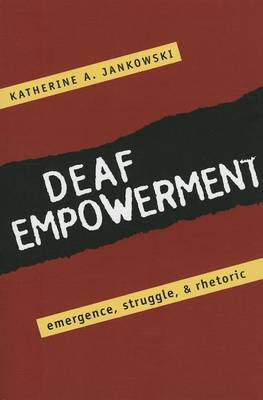Employing the methodology successfully used to explore other social movements in America, this meticulous study examines the rhetorical foundation that motivated Deaf people to work for social change during the past two centuries. In clear, concise prose, Jankowski begins by explaining her use of the term social movement in relation to the desire for change among Deaf people and analyzes the rhetoric they used, not limited to spoken language, to galvanize effective action.Central to Deaf Empowerment is the struggle between the dominant hearing society and Deaf people over the best means of communication, with the educational setting as the constant battleground. This evocative work first tracks the history of interaction between these two factions, highlighting the speaking majority's desire to compel Deaf people to conform to "the human sciences" conventionality by learning speech. Then, it sharply focuses on the development of the Deaf social movement's ideology to seek general recognition of sign language as a valid cultural variation. Also, the influence of social movements of the 60s and 70s is examined in relation to the changing context and perception of the Deaf movement, as well as to its rhetorical refinement.
Deaf Empowerment delineates the apex of effective Deaf rhetoric in describing the success of the Deaf President Now! protest at Gallaudet University in 1988, its aftermath, and ensuing strategies. It concludes with an assessment of the goal of a multicultural society and offers suggestions for community building through a new humanitarianism. Scholars of social movements and Deaf studies will find it to be a uniquely provocative addition to their libraries and classrooms.
- ISBN10 1563685884
- ISBN13 9781563685880
- Publish Date 22 February 2013
- Publish Status Active
- Publish Country US
- Imprint Gallaudet University Press,U.S.
- Format Paperback (US Trade)
- Pages 197
- Language English
